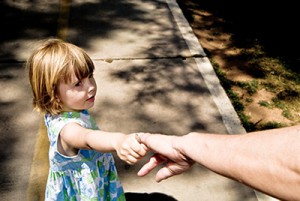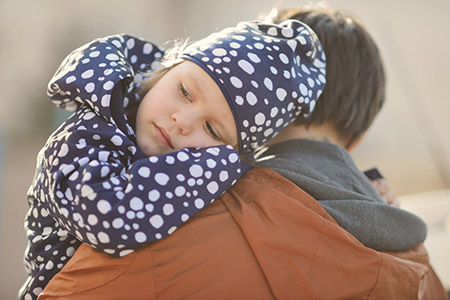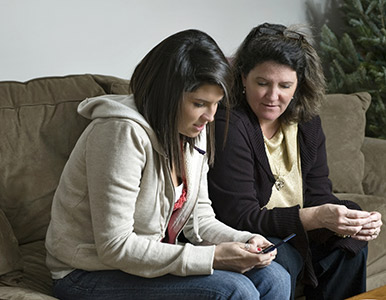Recognising that children are also impacted when somebody they love has dementia is an important step in providing them with the support they need. Often, their relationship with the person with dementia has changed. They could be witnessing traits of dementia that are difficult even for adults to cope with. In some cases, they may reside or begin residing with the person with dementia, and play a significant part in that persons care.
Click below to view a video of children speaking frankly about what it is like having a relative with dementia. This video was developed by Alzheimer’s Australia and Dementia Collaborative Research Centres.
Children are particularly intuitive about their parents’ emotions. They tend to know when something isn’t right, even when they haven’t been told. You might be feeling more stressed, anxious or frustrated than usual. Perhaps you’re struggling with sadness and exhaustion. You might find you’re less patient than usual.
Children express grief and distress differently to adults. They will often move in and out of intense feelings, rather than sustain high levels of an emotion for a long period of time. It is easy to assume that a child who is happily playing is ‘over it’ or unaffected. However this is a common misconception, and can impact on the level of support or attention a grieving child receives.
Signs that a child requires support: Clinginess, school refusal, sore tummies, withdrawal from family, questioning their worth, worries about illness in other family members, anger and frustration when embarrassed, feeling left out, feeling over responsible.
Understanding your child’s reactions
Children will often react to sad news in ways that adults might not expect or struggle to make sense of. Below is a list of common reactions in children according to age, as well as some helpful tips on how to help them.
Age
|
Common reactions
|
How to help them
|
Babies and toddlers
|
- Crying more
- Clinginess, wanting to be held
- Being jumpy, unsettled
- Irritability
|
- Keep normal routines as much as possible
- Hold and cuddle them more, provide comfort items (blanket, dummy)
- Be calm around them, talk calmly
|
Pre-schoolers
|

- Bed wetting (even if they had grown out of this)
- Changes in eating
- Changes in sleeping
|
- Start to teach them words to describe how they are feeling (‘sad’ ‘worried’)
- Remind them that they are safe and looked after
- Keep to routines as much as possible
- Encourage play
- Provide cuddles and comfort items
|
5-8 year olds
|
- Blaming themselves for distress in the family
- Being easily distracted, forgetful
- Being anxious, clingy, more fearful than usual (scared of the dark)
- Being defiant, tantrums
- Physical complaints, tummy pains
- Toileting problems
- Embarrassment
- Being quiet, distant
- Disconnecting after the initial discussion and returning to play
- Appearing to not be bothered
|
- Reassure them it is not their fault
- Frequently remind them they are safe
- Keep routines as much as possible
- Allow questions and provide honest answers
- Tell them you know they are sad/worried/annoyed
- Provide them with words to describe how they are feeling
- Explain that illness is a part of life, use some examples about nature or animals to help them understand
- Encourage play
- Allow them to be involved in caring for the person with dementia where appropriate (encourage them to draw a picture for the person)

|
9-12 year olds
|
- Can be especially anxious about the safety of family members
- Feel strong emotions such as anger, guilt, resentment, rejection
- May feel embarrassed and wish to conceal things from their friends
- Want to take on more adult responsibilities
- Retreating to introverted or solo activities

|
- Avoid expectations of adult behaviour, allow them to be children
- Provide regular encouragement
- Have honest discussions about what is happening
- Let them know that you understand what they are feeling and that it’s ok
- Explain that illness is a part of life, use examples of nature or animals
- Encourage routine and normality for them
- Allow them to be involved in caring for the person with dementia as appropriate
|
Teenagers and young adults
|
- Withdrawing to be alone
- Feelings of embarrassment, wanting to conceal things from their peers
- Having difficulty in expressing what they are feeling or having conflicting feelings
- A change in academic performance, being more distracted in class
- Behaving as though they don’t care
- A sense of loneliness
- Wanting to take on more adult responsibilities
- Wanting to take on less adult responsibilities
- Feeling guilty about planning for their future
- Not wanting to spend as much time at home
- Being irritable, resentful
|
- Be honest and keep them informed of what’s happening, take time to answer their questions
- Be willing to listen, even if you don’t like what they have to say

- Keep routines and activities going as much as possible
- It can be helpful to share with the teenager how you are feeling, particularly if you’re feeling the same way
- Allow them to be their age and not take on too much adult responsibility
- Have open conversations with a trusted teacher at school about what is happening in the family
- Encourage them to identify trusted people they can talk to
- Provide ongoing reassurance and support. It’s not uncommon for things to surface later on
- Encourage them to think of things that make them feel OK – reading, singing, listening to music, exercising, talking with friends
|





